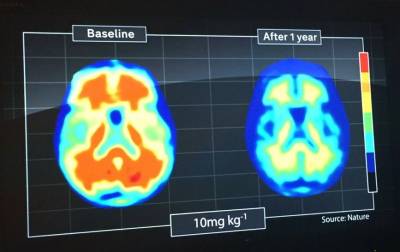Trial shows signs new Alzheimer's drug could benefit early-stage patients
1 September 2016
“The positive results from the phase I study of adecanumab are very encouraging, showing a marked reduction in amyloid load over time. In an exploratory analysis, there was a suggestion of associated slowing in cognitive decline. If that is confirmed in the phase III study I lead on for UCL, this could mark a major and exciting shift in our ability to treat Alzheimer’s disease. “ Dr Cath Mummery, Dementia Research Centre, UCL Institute of Neurology
Dr Cath Mummery, head of clinical trials at the Dementia Research Centre, UCL Institute of Neurology, was interviewed on BBC News and Channel 4 yesterday
evening about the interim results of a Phase I study of adecanumab, a monoclonal
antibody, reported in Nature.
Dr Mummery was not involved in the Phase I study but is now the Principal Investigator for the Phase III study being done at UCL Institute of Neurology on the back of these results. The sponsor is Biogen.
The study found a marked reduction in amyloid load using PET
scans and confirmed the drug removes amyloid from brains of people with Alzheimer's disease (AD).
The study showed some signal of slowing in cognitive decline associated with reduction in cognitive load. This is encouraging though definitive results from the phase III study are still needed.The Phase III study endpoint is cognitive and if that confirms the possible signal in the phase I (in 18-24 months’ time) that could be a game changer in the way we trial and treat in AD.

Further information
- Sevigny, J et al. The antibody aducanumab reduces Aβ plaques in Alzheimer’s disease Nature 537, 50–56. doi:10.1038/nature19323. Available online 31 August 2016
- BBC news (Dr Mummery interview starts at 11:50)
- Channel 4 news (Dr Mummery interview starts at 38:05)
- Dementia Research Centre (DRC)
- Leonard Wolfson Experimental Neurology Centre (LWENC)
- Dr Mummery's UCLH profile
- DRC trials contact – drctrialenquiries@ucl.ac.uk
Images courtesy of Channel 4 News and Nature
 Close
Close

